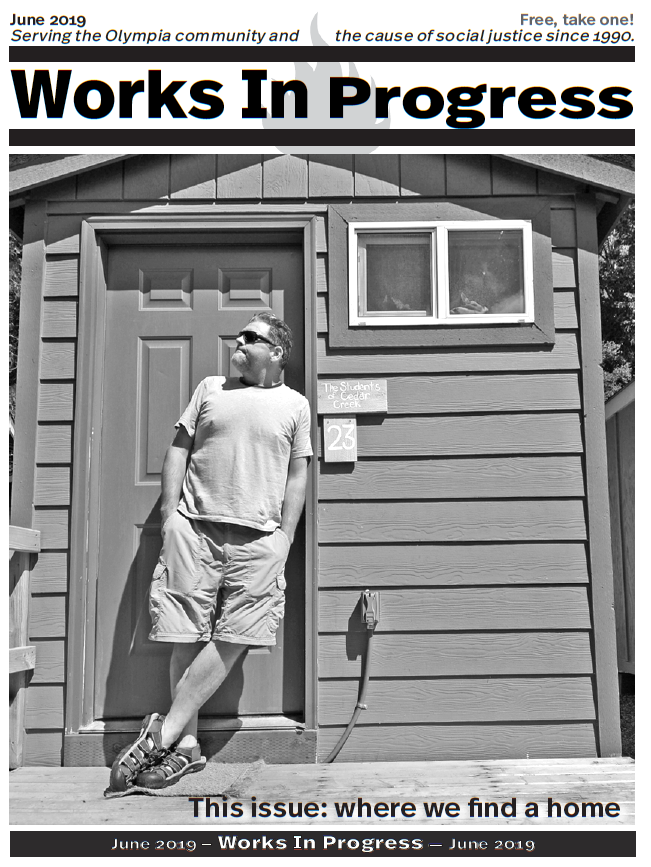In the current circumstances, it’s hard to think of a phrase laden with more cynicism than “home is where your heart is.” Under the sugar-coated implication that the location of ‘home’ is defined by an act of love lies the concealed notion that fulfilling human needs requires no material basis.
The harshness of this seemingly well-intended proverb becomes even more evident when we consider that over 555,742 people will experience homelessness tonight, or any other night, in the US. The numbers in this “disposable” class continue to increase, drawing primarily from Black and Latino people, low income white people, people who are unemployed, and people experiencing health disabling conditions.
In 2018, Washington State had the questionable distinction of having the 4th largest homeless population in the nation with 22,304 homeless people. 67% of these people are individuals, and 33% are families with children. Of the former, 7% are veterans and people with disabilities or addictions. In Washington last year, there were at least 234,362 extremely low-income renting households. At the same time, for every 100 extremely low-income renting households, only 29 affordable rental homes were available.
Given all this, perhaps attention needs to go not where home is, but rather why in the wealthiest nation in human history, so many Americans cannot find an affordable home except in the form of a cardboard box under a freeway overpass. Why do eleven million Americans need to spend more than 50% of their income on rent, leaving very little money to cover other basic necessities of life?
Why in the US does chronic poverty engulf over 47 million people, 14.% of the population? Why, at the same time, is there so much money available for the military which has an insane budget of over seven hundred billion dollars–higher than the combined budget of the ten wealthiest nations on earth? Why, in this context, did the current administration just give a trillion-dollar tax-break to the super rich? Why is the government so servile and obsequious, willing to bail-out Wall Street but blind to the needs of the people?
A short response is that the government has sufficient resources but lacks political will. It is not really a government of the people, and only the people can change this. For home to be more than an ideological construct, the people—that’s you, dear reader,— need to organize and advocate until we get a government that responds to our needs. Anything short of concerted, focused political actions in the broadest sense enables and legitimizes a government willing to perpetuate these social disparities. We must evict these perpetrators from the homes of power they currently and nefariously occupy. —EQ
July theme—Community. Tell WIP readers about the communities you’re part of; maybe how community helps individuals to express their uniqueness as part of a larger whole. We’d like to hear about how community is sustained, and maybe things that threaten to undermine it. Or..let this be a stimulus to your thinking and reflecting about this topic. Deadline June 16
August theme—Who’s running things? We’re interested in examples and analysis of this question as it plays out on the local, state and national level. Or even in your household or the world environment. Deadline for submissions: July 21.
About the cover
The cover photo by Paul Peck shows Michael Powers in front of his new home at #23 Plum Street Village in Olympia. The village consists of 30 tiny houses for 40 or more single adults and couples without children. Many of the Plum Street homes were built by volunteers, but men confined in the Cedar Creek Corrections Center also build tiny houses. Each is 8’ x 12’ and insulated, with electricity and heat, windows, and a lockable door. There is also a security house, a communal kitchen, meeting space, bathrooms, showers, laundry, a case management office, and 24/7 staff providing security and management. The Cedar Creek program is run by Centralia College in partnership with the Low Income Housing Institute (LIHI). LIHI also manages the Billy Frank Jr. Place low income apartments on State Avenue in downtown Olympia the Fleetwood Apartments and Magnolia Villa Apartments in Lacey.
Back Page
Download the Back Page: Support Our Newest Neighbors-Welcome Home Fund


Be First to Comment